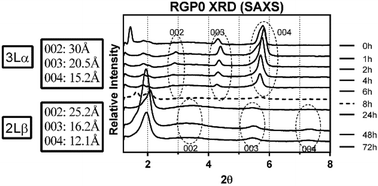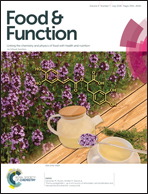Influence of thermal processing on the phase behavior of a novel acylglyceride-alkylglyceride lipid-based delivery system
Abstract
Lipid-based delivery systems have been broadly utilized to enhance bioavailability and bioaccessibility properties of drugs. Loading capacity and drug stability within the lipid matrix is influenced by the phase behavior of the lipid components that make up the vehicle. In this study we have investigated the influence of thermal processing at 50 °C on the subsequent phase behavior of a lipid-based delivery system comprised of a blend of monoacylglycerols, diacylglycerols, monoalkylglycerols and dialkylglycerols obtained by enzymatic glycerolysis of ratfish liver oil. Differential scanning calorimetry revealed that crystallization and melting points decreased, while powder X-ray diffraction suggested changes in the crystal structure of the product when heated to 50 °C and held for longer than 180 min. Samples heated for a short time, rapidly underwent a polymorphic transition from the α to the β polymorphic phase, whereas samples heated for long times remained in the α phase for 3 days. Polarized light microscopy also showed changes in the microstructure of the material due to the thermal treatment. These results suggest that the thermal history of lipidic encapsulation materials, above their melting point, can affect eventual encapsulation efficiency and product performance.



 Please wait while we load your content...
Please wait while we load your content...